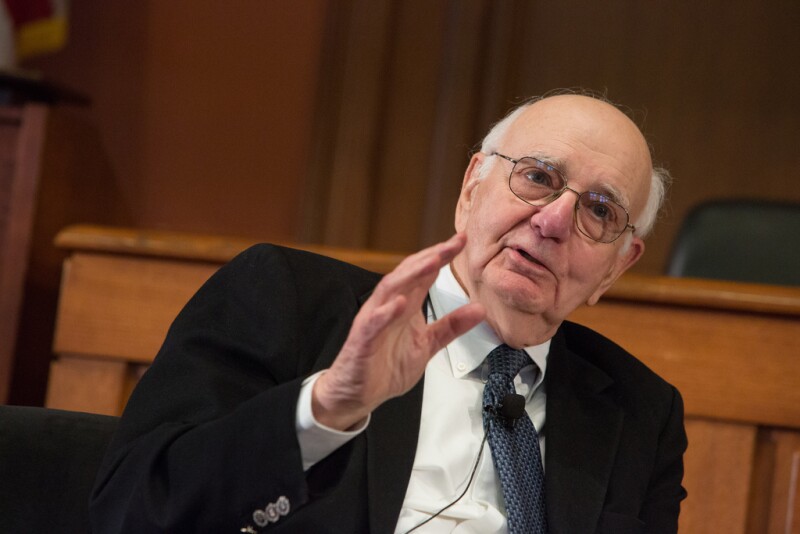This is an updated version of the original primer that was published on IFLR.com on June 29 2018.
Two of the main provisions of the Volcker Rule, as amended in June 2020, prohibit banking entities from proprietary trading, and from attaining or retaining an ownership interest in or sponsoring of a covered fund. This primer will look at the covered fund specific aspects of the rule, go here for a more general account of the Volcker Rule from IFLR, or here for a look at proprietary trading.
What are covered funds?
A covered fund under the Volcker Rule is an entity that (i) relies on section 3(c)(1) or 3(c)(7) of the Investment Company Act; (ii) is a commodity pool whose operator relies on CFTC Rule 4.7 (and certain similar pools); or (iii) a foreign fund that either relies on section 3(c)(1) or 3(c)(7) with respect to US investors or satisfies other criteria.
Loosely put, the Rule defines a covered fund as anything considered an investment company in the Investment Company Act, including private equity and hedge funds, as well as commodity pools with certain exclusions, and funds sponsored by a US banking entity where the affiliate holds ownership interests.
"It's not an easy definition to navigate. So, it's unhelpful to ignore and not deal with the Treasury report recommendations and fail to address this very basic definition" |
The Volcker Rule prevents banking entities and insured depository institutions from investing, or owning, any assets into covered funds or vehicles, suggesting that this sort of activity incorporates too much risk and does not benefit the customer base.
See also: PRIMER on the Volcker Rule
“A banking entity may not, as principal, directly or indirectly, acquire or retain any ownership interest in or sponsor a covered fund,” reads the Rule.
What are the exclusions?
The Rule provides for several exclusions that fall into the covered funds category, and that as such are not subject to the Volcker Rule. These include foreign public funds, wholly-owned subsidiaries, joint ventures, acquisition vehicles, securitisation related vehicles, funds regulated under the 1940 Act such as mutual funds, exchange traded funds or business development companies, foreign pension or retirement funds, insurance company separate accounts, small business investment and finally entities used by the Federal Deposit Insurance Corporation to dispose of assets as receiver or conservator.
What is the problem with covered funds?
The aforementioned list is fairly extensive, which leaves a lot of room for objections, loopholes and debate. It is a lawyer’s paradise, according to Simpson Thacher partner Keith Noreika. He told IFLR in an interview during his time as the acting Comptroller of the Currency: “It is entirely an odd construct that can be maneuvered around with skilled lawyering, I’m not sure why we have it other than to keep lawyers fully employed. An observation as a policy maker that I think we have to be mindful of, we shouldn’t just have useless compliance exercise.”
For the June 2018 edition of the magazine, IFLR surveyed a number of in-house counsel and compliance officers at major banks to identify what some of the issues with the Volcker Rule were at the time. Respondents were asked whether they thought exclusions or additional exclusions should be amended should the definition of covered funds remain unchanged. Around 70% suggested that the exclusions should be indeed be amended.
"We tend to use more laymen terms, and rules that are closer to the industry, than use difficult to understand legal terms to define some like this," said one overseas control officer.
"It should be more laymen in this sense. Making it more layman is the difficult part, private equity funnels, hedge fund, there must be some tax definitions – even that or sticking to the legal rules. Of course it will be more up to the regulators themselves to strike a balance," he explained.
The policy objective was aimed at hedge funds and private equity funds. The actual definition has been seen as bringing in more than what was intended and has created some confusion. It is a highly contested issue, but if a way was found to simply say that banking entities should not be permitted to invest more than a certain amount in hedge funds or in private equity, this could address the concern.

Referring to the foreign fund aspects of the Rule, one respondent, a Volcker control officer at a major foreign bank, said that many banking institutions operate under a global universal banking model, which as an entity that operates outside the US it is difficult to adapt to. "Whatever entities may relate to the US, we can adopt this exemption, but it is counterintuitive. They all have their pros and cons," he said.
There is always a difference between how the rules are crafted and what expectations they put on institutions. With this many definitions there is always room for modification in the expectations that the agency would have for institutions. Certain institutions will have to go through the process of scrubbing their portfolios and justifying that they don’t include any covered funds, to avoid engaging in any impermissible trading activities to prove they are compliant.
What about the definition of banking entity?
The definition of what constitutes a banking entity is also up for debate. The definition is broad and covers not only banks but also their affiliates and subsidiaries. Some suggest narrowing the definition to apply only to banks that are systemically important to the US financial system and some call for the it to apply only to US banks and their US affiliates and subsidiaries.
The definition has been accused of unintentionally picking way too much up in its scope in the rest of the world, when it is really having no effect on what is happening in the rest of the US. Sources would suggest amending it to include banks and bank holding companies and affiliates in the US, and foreign banking organisations to the extent that straight down the line to the US entity or affiliation it is not creating a lot of difficulty.
See also: PRIMER the Volcker Rule – proprietary trading
Another general counsel, this time at a foreign bank, does not advocate changing the definition. “All regulations need definitions and carve outs. It makes sense for some senior rates to include that, I don’t think right now when firms complain that Volcker is unclear, it is anything to do with the banking entities. I think that part itself, there is no problem.”
Have any steps been taken to simplify things?
Since the change of administration in 2016 there have been great lengths taken to deregulate the financial industry. The Dodd-Frank Wall Street Reform and Consumer Protection Act, which contains the text of the Volcker Rule within its 2,300 pages, is public enemy number one as far as the administration is concerned, and Volcker is no exception.
In January 2020 the five federal financial regulatory agencies responsible for the Rule invited public comment on proposals to modify regulations implementing the Volcker Rule’s covered fund provisions, including the prohibition on banking entities investing in or sponsoring certain funds.
On June 25 2020, the agencies finalised the amendments in a manner that is substantially consistent with the proposed amendments from earlier in the year. These amendments will be effective as of October 1 2020.
According to the agencies the amendment modifies three areas of the Rule by: streamlining the covered funds portion, addressing the extraterritorial treatment of certain foreign funds; and, permitting banking entities to offer financial services and engage in other activities that do not raise concerns that the Volcker Rule was intended to address.
Sources are generally happy with the changes to current covered fuRd exclusions (foreign public funds, public welfare funds, and loan securitisations), such as the clarification for loan securitisation vehicles that allows the holding of other assets, including certain debt securities and cash equivalents.
Similarly, sources are pleased with the amendments that introduce several new covered fund exclusions, including exclusions for credit funds, venture capital funds, family wealth management vehicles, and customer facilitation vehicles. For Anna Pinedo, partner at Mayer Brown, the most important aspects are those concerning customer facilitation vehicles: "Having spent a fair amount of time working with banks that - pre-financial crisis - provided hedge fund and private equity fund exposure through a structured note or a swap, this change means that banks may be able to return to some of what they did before the financial crisis, which posed no systemic risk" she said.
"Following the adoption of the Volcker Rule, the issue for the banks performing these functions was to have some way of acquiring an interest in the fund to hedge their own exposures. Prior to this change that would have been impossible."
Under the 2013 final rule, there was an exemption to the covered fund prohibition for underwriting or market-making activities relating to covered fund ownership interests subject to specified conditions. Among these conditions, a banking entity was required to aggregate the value of all of its ownership interests in third-party covered funds toward a 3% of Tier 1 capital limit and capital deduction requirement.
Pursuant to the 2019 amendments, a banking entity no longer needs to include the value of its ownership interests in third-party covered funds held as underwriting or market-making positions toward the 3% aggregate limit and capital deduction requirement. Directly or indirectly guaranteeing or assuming the obligations of a covered fund would not cause a banking entity to have to treat that covered fund as a related fund.
"The recent amendments also allow a banking entity to engage in additional risk-mitigating hedging activities in relation to covered funds,: said Pinedo. "A banking entity may acquire or retain an ownership interest in a covered fund as a hedge when the banking entity acts as an intermediary on behalf of a customer that is not itself a banking entity in order to facilitate exposure to the covered fund’s returns."
"The ability to relax certain Super 23A requirements is also very important," said Pinedo. "There is a new standard on exceptions for riskless principal transactions that is very useful because a lot of brokers do tend to conduct activities on a riskless principle basis. The new exception for transactions that are entered into to facilitate settlement clearing payments, is very positive."
The 2019 amendments also expand the solely outside the United States, or SOTUS, exemption. A foreign banking entity may rely on an exemption to the covered fund prohibition for covered fund investments and sponsorship that takes place solely outside the United States. A US branch or affiliate may provide financing for the foreign banking entity’s ownership interest of the foreign fund without jeopardising the SOTUS exemptionhe foreign banking entity also may engage a non-affiliate US investment adviser provided that the actions and decisions of the banking entity as principal occur outside of the United States.
The amendments also codify the marketing restriction guidance (FAQ 13 from 2015) provided by the banking agencies, such that an ownership interest in a covered fund is not considered to be offered or sold to US residents unless sold in an offering that targets US residents in which the banking entity or an affiliate participates. If the banking entity or an affiliate sponsors or serves as the investment manager, investment adviser, commodity pool operator or commodity trading adviser to the covered fund, then the banking entity will be deemed to have participated in the offer or sale of ownership interests in the covered fund.
“In the amendments to Volcker there wasn’t actually a specific change to the definition of covered funds,” she said. “We continue to have this very legalistic definition of covered fund that refers to Section 3(c)(1) or 3(c)(7), and honestly most foreign non-US lawyers are not all that familiar with the Investment Company Act, are not necessarily familiar with Section 3(c)(1) or 3(c)(7) and aren’t familiar with the other exemptions under the US Investment Company Act.”
“I don’t think it is a very easy definition to navigate. So, I don’t think that is helpful to ignore and not deal with the Treasury report recommendations and fail to address this very basic definition," she added. “It's helpful that the agencies requested comments, but when are we going to see actual changes? It is disappointing that there wasn’t more there on covered funds."
See also: PRIMER the Volcker Rule – proprietary trading

